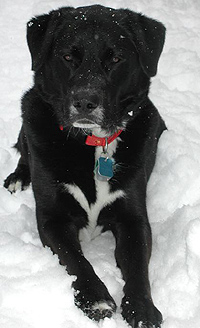
An animal shelter or pound is a place where stray, lost, abandoned or surrendered animals – mostly dogs and cats – are housed. The word "pound" has its origins in the animal pounds of agricultural communities, where stray livestock would be penned or impounded until they were claimed by their owners.

Osgoode Hall Law School, commonly shortened to Osgoode, is the law school of York University in Toronto, Ontario, Canada.
Trap–neuter–return (TNR), also known as trap–neuter–release, is a controversial method that attempts to manage populations of feral cats. The process involves live-trapping the cats, having them neutered, ear-tipped for identification, and, if possible, vaccinated, then releasing them back into the outdoors. If the location is deemed unsafe or otherwise inappropriate, the cats may be relocated to other appropriate areas. Ideally, friendly adults and kittens young enough to be easily socialized are retained and placed for adoption. Feral cats cannot be socialized, shun most human interaction and do not fare well in confinement, so they are not retained. Cats suffering from severe medical problems such as terminal, contagious, or untreatable illnesses or injuries are often euthanized.
CFIQ is a commercial radio station licensed to Richmond Hill, Ontario, and serving Greater Toronto, Southern Ontario and Western New York with a talk format known as "640 Toronto". Owned by Corus Entertainment, CFIQ's studios are located at the Corus Quay Building in Toronto; despite the station's city of license being a suburban community north of the city, the transmitter resides in the Niagara Region town of Lincoln, 60 kilometres of Toronto.
Christine Hart is a former politician in Ontario, Canada. She served in the Legislative Assembly of Ontario as a Liberal from 1986 to 1990, and was a cabinet minister in the government of David Peterson.

Nicholas dePencier Wright is a Canadian business lawyer and politician. He was the founding leader of the Green Party of Nova Scotia and was the founding Executive Director of the Canadian animal advocacy organization Animal Justice. He is currently founder and CEO of foreign affairs publication Geopolitical Monitor and was an elected member ("Bencher") of the governing body of the Law Society of Ontario (2019-2023).
A no-kill shelter is an animal shelter that does not kill healthy or treatable animals based on time limits or capacity, reserving euthanasia for terminally ill animals, animals suffering poor quality of life, or those considered dangerous to public safety. A no-kill shelter uses many strategies to promote shelter animals; to expanding its resources using volunteers, housing and medical protocols; and to work actively to lower the number of homeless animals entering the shelter system. Up to ten percent of animals could be killed in a no-kill shelter and still be considered a no-kill shelter.
Alternative dispute resolution (ADR), or external dispute resolution (EDR), typically denotes a wide range of dispute resolution processes and techniques that parties can use to settle disputes with the help of a third party. They are used for disagreeing parties who cannot come to an agreement short of litigation. However, ADR is also increasingly being adopted as a tool to help settle disputes within the court system.
The Arbitration Roundtable of Toronto is made up of several litigators, academics, arbitrators, and mediators from the Greater Toronto Area. The group promotes arbitration as an alternative method of conflict resolution over litigation, especially in commercial suits. Members include commercial litigators from Toronto law firms including some of the Seven Sisters of Bay Street. Each member has experience and interest in promoting commercial Arbitration. The group dedicates its time to encouraging this form of Dispute resolution through seminars, papers, and talks.

Harvey Brownstone is a retired judge of the Ontario Court of Justice and the first openly gay judge in Canada. He is also a bestselling author and host of a television and internet talk show.

Black dog syndrome or big black dog syndrome is a phenomenon in which black dogs are passed over for adoption in favor of lighter-colored animals. Animal shelters often use the term BBC, or big black canine, to describe the type of larger dark-colored mixed-breed thought by some to be passed over by potential adopters. Black cats are similarly reported to be subject to the same phenomenon.
The National Animal Interest Alliance (NAIA) is a non-profit organization in the United States dedicated to promoting animal welfare and animal husbandry practices, strengthening the human-animal bond, and safeguarding the rights of responsible animal owners and professionals through research, public education and public policy. The NAIA mission is "to promote the welfare of animals."
Alanna Devine is a Canadian lawyer who practices animal law in Quebec and Ontario. She completed her undergraduate degree in criminology at the University of Toronto and obtained degrees in civil and common law at McGill University Faculty of Law in Montreal, before clerking for the Honorable Justice Louise Charron at the Supreme Court of Canada. While a student she founded the McGill Student Animal Legal Defense Fund, a chapter of the Animal Legal Defense Fund. She has been a member of the Law Society of Ontario since 2007.

James V. Maloney is a Canadian lawyer and politician, who was elected to the House of Commons of Canada in the 2015 election. He represents the electoral district of Etobicoke—Lakeshore as a member of the Liberal Party caucus. In September of 2023 he was appointed Parliamentary Secretary to the Minister of Justice and Attorney General.

Nathaniel Erskine-Smith is a Canadian politician who is the member of Parliament (MP) for Beaches—East York. A member of the Liberal Party, Erskine-Smith was elected to the House of Commons in the 2015 federal election. Before entering politics, Erskine-Smith was a commercial litigation lawyer. In 2023, Erskine-Smith was a candidate in the 2023 Ontario Liberal Party leadership election, which he ultimately came second to Bonnie Crombie with 46% of the vote.

Allan Jeffrey Stitt is a chartered Canadian arbitrator, mediator and film producer. He is the president and CEO of ADR Chambers, a Canadian arbitration and mediation organization. Stitt is the recipient of the 2006 Ontario Bar Association Award of Excellence in Alternative Dispute Resolution. In 2022, Stitt was awarded an honorary Doctor of Laws from the University of Windsor Faculty of Law. As a movie executive producer, Stitt has also contributed to films including The Layover, The Birth of a Nation, Into the Forest, I Saw the Light, and Ithaca.
Claude R. Thomson was a Canadian lawyer in Toronto, Ontario. He was a well-known courtroom lawyer, and also a pioneer of alternative dispute resolution in Canada, including mediation and arbitration. He served as the president of the Canadian Bar Association and the International Bar Association.

Mohamed Manjee Keshavjee is an international cross-cultural specialist on mediation, with a focus on Islamic Law and Alternative Dispute Resolution (ADR).

Philip Michael Epstein is a Canadian family law lawyer.
The ADR Institute of Canada (ADRIC), is a non-profit organization that offers alternative dispute resolution services to its members and the public across the country. It is one of the leading authorities on ADR in Canada, offering highly respected professional designations for both mediation and arbitration, with plans for a mediation and arbitration (Med-Arb) designation in the works. ADRIC has also created an established set of ADR rules and codes, outlining the principles by which its affiliated ADR practitioners commit themselves to following. Beyond promoting ADR and networking and training individuals in ADR practices, ADRIC presides as the national body of the seven regional affiliate bodies of the ADR Institutes in Canada:










